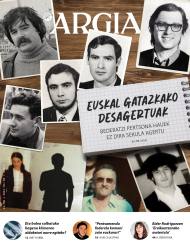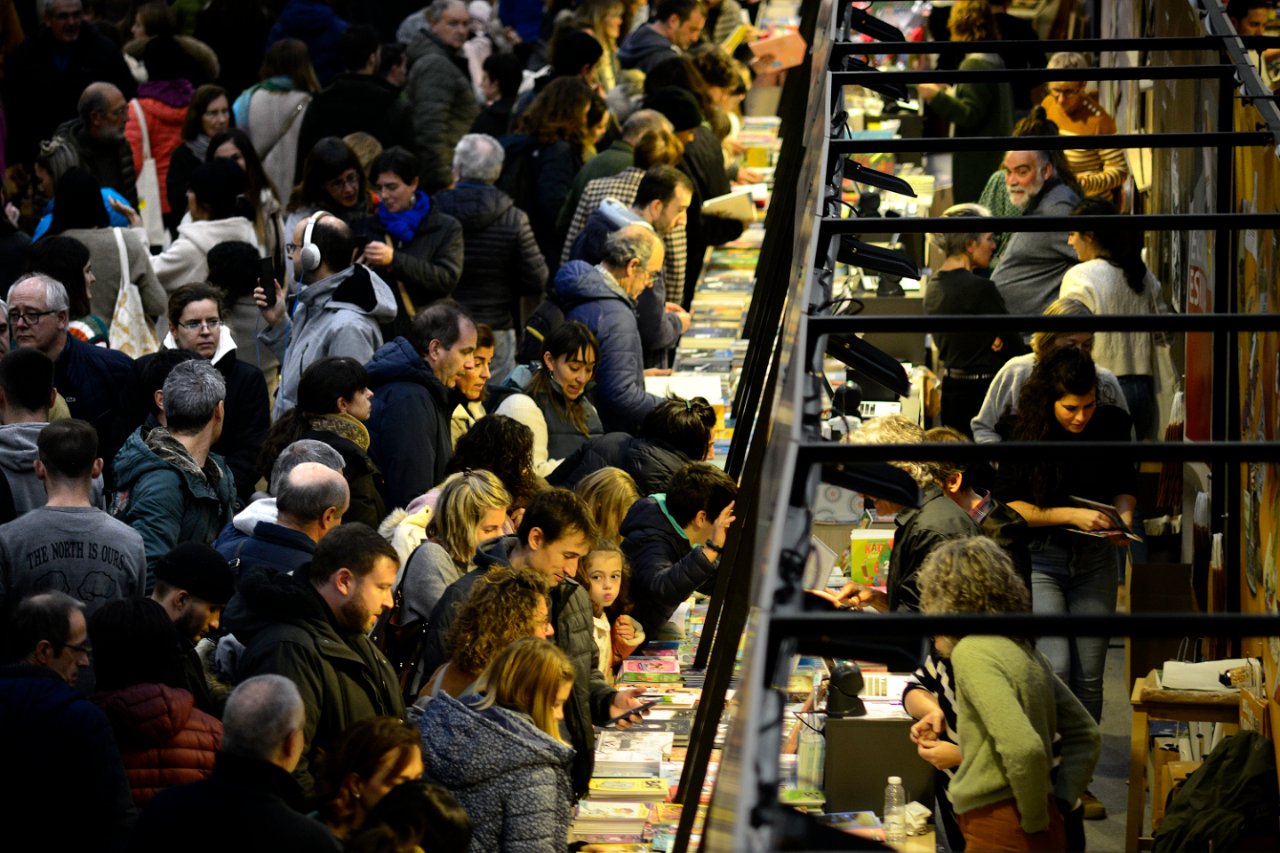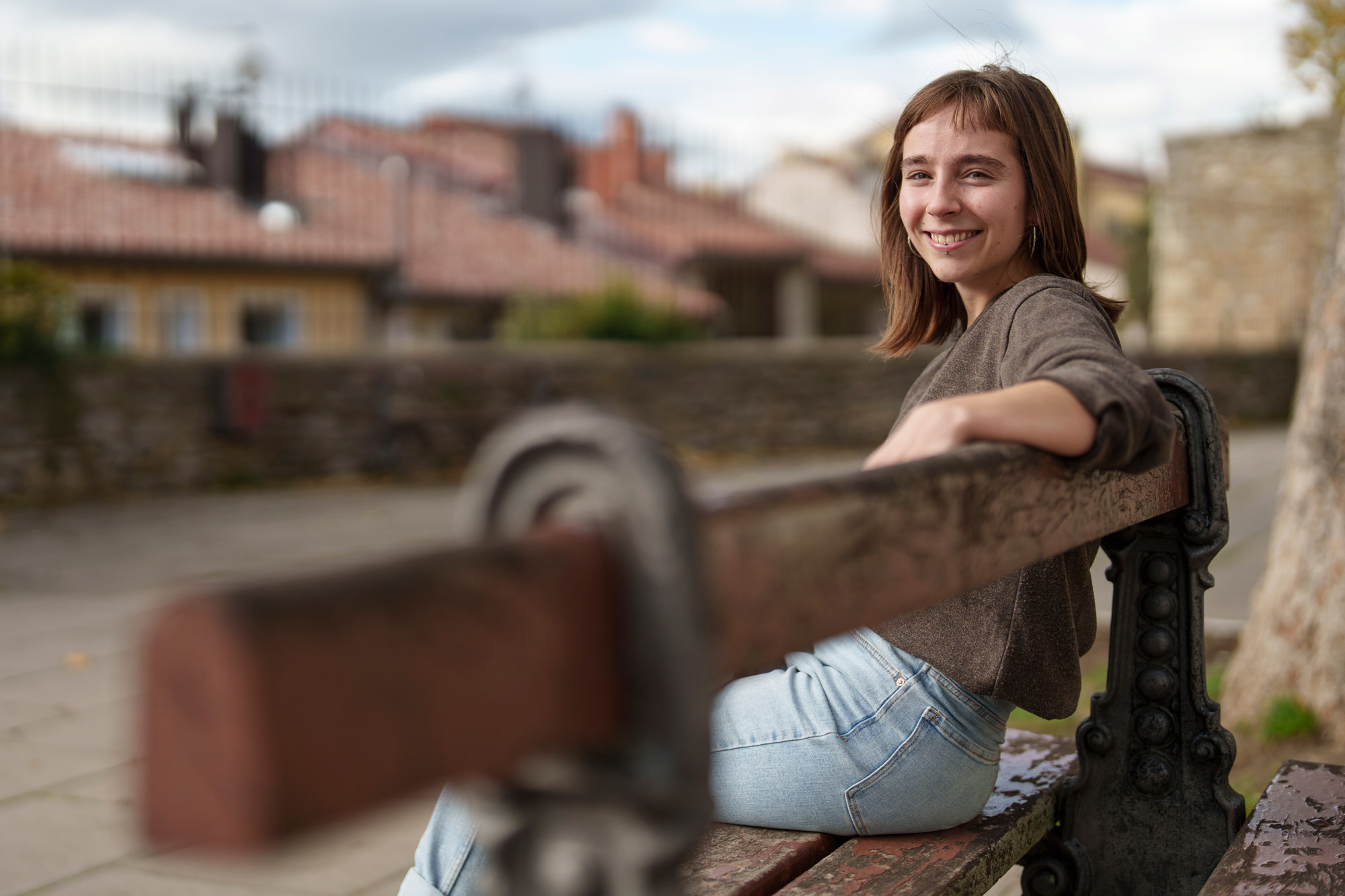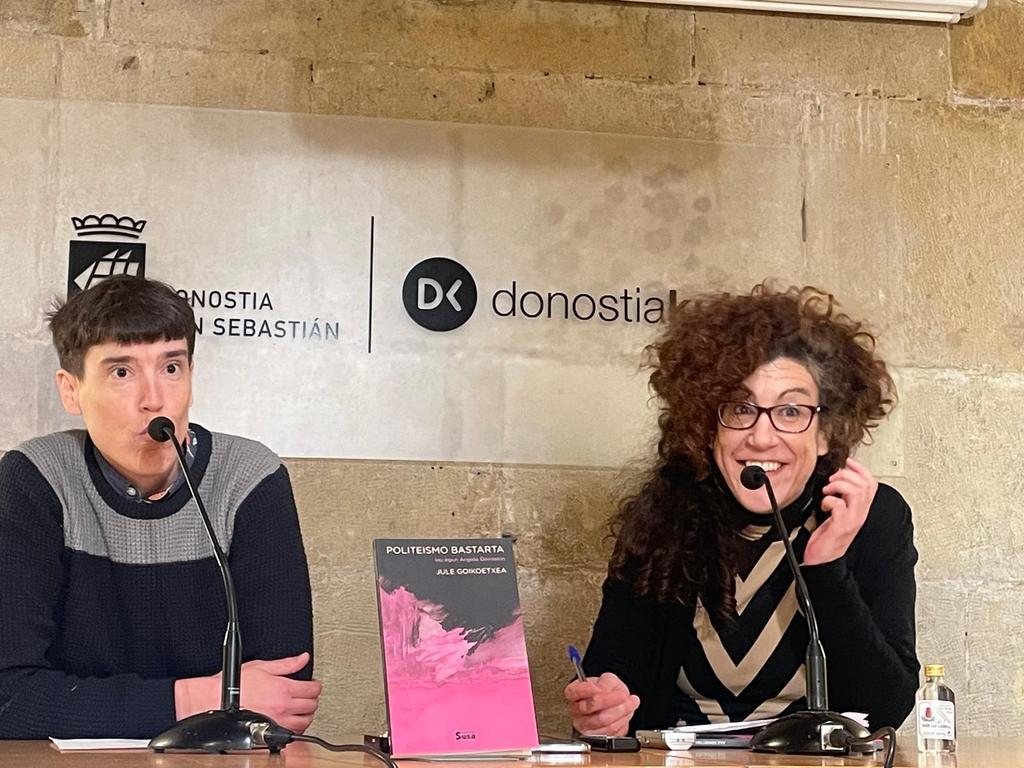"It was important for me to show up with little makeup."
- The material for construction (Susa, 2021) has been published by Eider Rodríguez, his first literary work since Bihotz handiegia (Susa, 2017). Pending the death of her father, a daughter who is also a writer, ponders her relationship with him, in a fractional and fragmented way, alternating materials and voices. As Maurice Blanchot says, let us talk about disaster.

How is the completion of the publication?
The truth is that reception is being very good. I've been approached by more people, even physically, to think or to tell me something than with previous work. When I was presenting the book, it was a little hardened, but what's come from people has helped me to soften. And accepting what I've written.
In the presentation, he said that this is a book you wouldn't prefer to write, but once you started writing it went en bloc.
It is a story that I preferred not to write, because I would rather not live, but once lived, the moment of transforming the lived into a story has been very enriching. A friend told me that what I've written so far has been a preparation to write this other one. I don't think that's it, but I have a feeling that I haven't had a head-breaking like stories. I've felt quite graphically, throwing and throwing. I don't know where.
What has been different when it comes to writing stories?
It is a book written by ears. I had to constantly listen to the melody that I had, although I haven't read it on my back. I've followed a music or a melody. In a story that doesn't take me. I need more scaffolding to write a story, even if it's shorter.
How have you managed the issues and amenities that may arise from the use of autobiographical material?
When writers say we have a story, what do we mean? In my case, I think it means that I have something I want to tell to be able to understand it or to get somewhere else. And with this the same thing. I had an autobiographical material that I had never narrated, that I had never written and that I had to write what I thought I had to write in order to understand it in some way. From there, my starting point has been honesty, honesty, what I was on the road whatever it is.
Then writing is a very rare thing, a liminal space. It's not for you, because if I had written it for me I wouldn't have written it in any way, but it's also not thinking that I'm writing it for others, because if I thought that I wouldn't have written it that way.
And at the time of introducing the novel?
So I've had a lot of things: fear, regret, guilt, the urge to step back. In the end, you don't know how people are going to take it, because that's not where a painted picture appears. But at the same time, if I hadn't done that in my career, I don't know how I'd go ahead. I don't know now either, but it was important for me to show up with little makeup.
.jpg)
Do you think it can be a milestone?
You mean a milestone in my trajectory? No. I don't have a literary plan. I don't think it's good or bad, but I don't work like that. It was a personal milestone, yes.
But don't you think this personal milestone can influence your later writing?
Yes, but what not? I had a story and did not want to give up writing that so people could decir.El
Material for Construction narrates the development of the relationship between parents and mothers and describes with great precision the paternal alcoholism, all that it generates around them, as well as the attitude of society. Being integrated into our culture is hard for us to talk about. Do you think the book can be used to influence it?
The starting point of the book has been the father and daughter, a long and complicated and sad relationship between them. That's what I wanted to tell. Of course, everything is crossed by alcohol. But the challenge wasn't to talk about it, and I didn't know it had such a presence. When I finished I realized that there was also a history of alcohol. It is also an example of massacre in our country. Some readers have approached the book out there and the war has been going on.
I think the novel has the virtue of showing the social history of the last 40 years through a concrete narrative.
It was clear that Orereta had to have a great presence, and the time too, because it's totally linked to history. In the end, a book is an artifice, and I wanted to get somewhere else telling this story, not just release my knot. I wanted that to tell people something else. When we write, I think we try to do it. And it's also something done from an aesthetic point of view, and I'm looking for a blow in that sense.
"When I finished I realized there was also a history of alcohol. It's also an example of massacre in our country."
The relationship between the Erdaldunes parents of the book and the Basque Country is significant.
That's what I necessarily had to write about, because history was brought by her, and at Orereta we've been ourselves and the others in a very obvious way. I can talk about others as we talked about it, I don't know the other side. I know it exists, but it is not for me to tell you.
I've written it with a big pudore, because the perspective is very hard: the family of the narrator belies the other to make him feel even more present. However, it is not a question of saying “look what malignant or what xenophobic are”. That wasn't what I was interested in, but the motivation behind it. There's a desire for rooting, a rage to defend an ecosystem like yours, in a wild and ugly way, but why? That part interests me.
Her mother comes from a Castilian family, but was born in Euskal Herria and has no relationship with Castile, while her father is from an Euskaldun family, born there, but without Euskera.
There's a lot of typologies between the people here and the people there, and those nuances seemed really interesting to me, because we also came from there, and I think it's important to see what we are and what we want to be. I do believe that this issue has been dealt with gradually.
The narrator has been raised in mistrust towards men, which is clearly seen in his relationship with men.
There is a reflection of an era. That's where we also came from. When we talk about romantic love, and how we have been educated… I think we have been educated in many ways and there are many nuances. In the book, we see a working mother, economically more independent than she thought, and yet, or probably because of that, she tells her daughter that she doesn't believe in religion or politics or men, putting them all in the same bag. And when you don't have a model, when you don't have tables at the center of that shipwreck -- it's hard.
In this regard, I'd like to mention a scene where the narrator goes to a concert with his boyfriend and another guy who attracts him. At first there is a certain rivalry between two men, who are twinned when they accidentally know the parents of the narrator.
In this scene you see the male fraternity, as you say, the relationship between two totally different men and how the typa is devalued in your eyes when you see your family without any glamour. But devaluation also occurs within the same type.
.jpg)
Another phenomenon appears in the book, which seems to me to be very striking and at the same time very real. How to solve some paterno-affiliate misunderstandings with the presence of grandchildren: “Peru and Mikele have given him the most satisfaction in the last twelve years [his father]” and “If the father were here Mikel would have had a huge hug and I would have felt through his body.”
Don't you think family genealogies are very rare in the end? I saw it as if there were generations who were bothering. In this family, it has been necessary for a generation to be able to carry out this hug, the expression of love between grandchildren and grandparents, and I think this happens many times, in a very crazy way. It's very crazy, because in the end you can't express love between mothers and fathers and children is a very rare thing, and at the same time it's so common that most of us are trapped.
I think the wager was risky, but, at least for me, the narrator's gaze has remained: there is a balance in that gaze, from coldness and from heat.
One of the things that I have very much in mind is what we are all mad at, what thoughts, feelings and actions are undesirable, contradictory and harmful, what species is defective in that sense. What chaotic and above all what we can be self-destructive at times. And I think we have to count all that part so that we too have that mirror. For me, the challenge is to explain everything without falling into the caricature or without a hyperacid ironic distance.
Have you considered any literary or artistic model in the construction of the book?
I have also been very much aware of Annie Ernaux, Natalia Ginzburg, Jamaica Kincaid and Marguerite Duro, but not of a work or a concrete structure. These writers have given me some strength; in the end, they, working on autobiographical materials, have made texts that are literally very interesting to me. When I first read the Lover of Hard produced a great mermaid, and I think it's always with me, not physically, but when I write it is always a referent.
As far as the structure is concerned, I think there is a kind of way forward. In the first two sections we take the perspective of the daughter. In the third paragraph, on the contrary, we are gradually approaching the father, and in the last paragraph he tells us about him, through the letters of the mili.
My goal was to reach this figure from different places: the perspective of the daughter when she is a child, the vision of the daughter when she is a mature woman and she is also a mother, and also, I was trying to describe the relationship between these parents from outside, hence the third part. And then I was lucky, or I don't know what it was, that Arrate had found letters [Rodríguez] and you can hear with letters the real voice of this man, even if it's not real, because it's translated, and that's also part of the artifice. In the end, it all comes out of the same writer, but I wanted that essay to draw different edges.
Words of the narrator in the first pages of the book: “Maybe everything is a linguistic problem. From the beginning.” A problem to be solved through literary language?
I remember when I wrote that phrase, I didn't really know what I meant, and I still don't know very well. I'm going to mention a few things: there's a negligible parent, you can't speak, no matter what language, it's hard to say things; then there's the insignificance of that character who is a writer and who is also a daughter: a lot of languages, a lot of literature, is looking for a certain aesthetic mysticism, but then he's not able to say things, to speak. I think the whole book is to want to give a solution to this problem.
Would you say you've done it?
There has been an approval and there has been a closure. Then everyone has their ways of doing it, I have found this, and I have known through writing some aspects that I didn't know before. It's been a search.
Apparently, I was writing stories before I started this story. Have you returned to the narratives?
I've been correcting the stories I had written, and now I'm looking forward to starting another story. I have had something else, which I do not know what is going to happen and not a whole story, but the truth is that I really want to make a fiction. You want, need and everything.
Joan Tartas (Sohüta, 1610 - date of unknown death) is not one of the most famous writers in the history of our letters and yet we discover good things in this “mendre piece” whose title, let us admit it from the beginning, is probably not the most commercial of the titles... [+]
















ilbeltza-(1).jpg)








